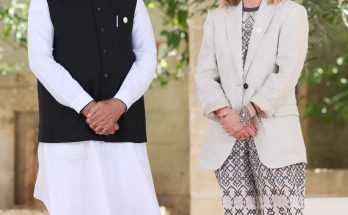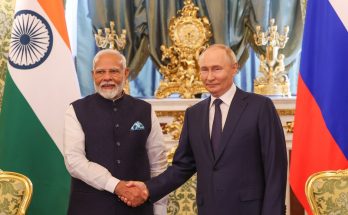By Shweta Aggarwal
Building on Prime Minister Narendra Modi’s historic visit to Bangladesh nearly a fortnight ago, eminent diplomats, experts and politicians have pitched for forging a robust youth friendship bridge by roping in the next generation in both countries to propel bilateral ties to new heights.

Setting the tone for increasing youth exchanges, India’s High Commissioner to Bangladesh Vikram Doraiswami underlined the need for greater involvement of young people in taking India-Bangladesh relationship to the next level. “India and Bangladesh are among the youngest countries in the world in terms of youth profile and profile of the population,” he said in his Keynote Address at a webinar organised by India Writes Network and India and The World magazine on April 8.
“Bringing the new generation of future leaders of Bangladesh and India into a new interpretation and understanding of the relationship is going to be critical for moving the relationship forward,” he said.

The Indian envoy underscored the imperative of shaping the bilateral relationship in such a manner that is relevant to the next generation of Indians and Bangladeshis – which is where technology, trade, travel and the ease of doing business and the ease of connecting with each other comes in as essential focal points.
In a similar vein, Nahim Razzaq, a Member of Parliament from the ruling Bangladesh Awami league, spoke about the need for creating an ecosystem where India and Bangladesh can connect the youth of these countries. “The young generation want to see and learn and collaborate together in creating their own business connectivity. We have to create an ecosystem where we share the emerging ideas that bond us together,” he said.

“As a regional powerhouse, we look up to India in terms of taking the lead in terms of bonding this relationship. The young generation are very much connected in areas such as education and health sector,” he said. “We need to be more kind of proactive in terms of disseminating these ideas across the board,” he stressed.
New Vistas
“PM Modi’s historic visit has raised the bar and opened new vistas in this multi-layered partnership such as forging youth connectivity, start-ups and emerging technologies,” said Manish Chand, CEO and Editor-in-Chief, India Writes Network and India and The World magazine.

“Based on the December 2020 digital summit and PM’s March 26-27 visit, the only way India-Bangladesh relations can go is up and up – climbing new peaks, setting new benchmarks,” said Mr Chand, also president of Centre for Global India Insights.

During his visit to Bangladesh, PM Modi announced India-Bangladesh partnership in start-ups and invited 50 entrepreneurs from Bangladesh to visit India to join the country’s start-up and innovation ecosystem and meet India’s venture capitalists. He also announced 1000 Swarna Jayanti scholarship for youths of Bangladesh.
“India is central to Bangladesh in every sense of the word. It is not only within the bilateral, but also within the regional and international framework,” said Mr Shahidul Haque, Bangladesh’s longest-serving foreign secretary, who retired last year. The veteran diplomat underlined the imperative of building a positive narrative of India-Bangladesh relations and cautioned against vested interests who are trying to inject negativity into the relationship.
Eminent diplomats and experts spoke at the webinar, including Amb. Veena Sikri, India’s former High Commissioner to Bangladesh; Amb. Anil Wadhwa, Former Secretary (East), India’s Ministry of External Affairs; Dr Amena Mohsin, Professor, Dhaka University; and Dr Prabir De, Professor, RIS.

Mr Haque also exhorted the two sides to move beyond the shadow of the unresolved Teesta river water-sharing issue and focus on areas such as water resources development. “Time has come when Bangladesh and India should look at water resources development and governance rather than just looking at the Teesta issue,” he said, while suggesting the need for setting up a think tank focused on these issues.

Responding to a question on rising fundamentalism and radicalism in Bangladesh, Dr Mohsin stressed on drawing a distinction between violent extremism which is religious centric and the use of politics in the domestic arena. “I don’t think it will have any major impact in its relations with India because we have seen the rise of religious nationalism in our neighborhood also but that has not affected the foreign policy aspects or bilateral relations between countries,” she said.
Indo-Pacific Connect
Amb. Wadhwa- highlighted the importance of Bangladesh for India’s Indo-Pacific policy and Act East strategy and highlighted that Bangladesh can gain substantively from connectivity, infrastructure and trade which is a primary Indian agenda in the Indo-Pacific.
Mr Wadhwa, however, rejected rivalry with China and underscored that India should focus on its own model of engagement with Bangladesh. “We should concentrate on what are the best forms of collaboration between India and Bangladesh and leave others to do what they are doing,” he said.
Looking ahead, Amb. Veena Sikri outlined emerging areas of cooperation between India and Bangladesh such as the blue economy. “Bangladesh and Bay of Bengal are very vital for the success of peaceful and stable Indo-Pacific. Information and Communication Technology and Financial connectivity are two important projects for the future,” she said.

“Bangladesh is very much part and parcel of India’s Act East policy. Bangladesh is planning to do several bilateral FTAs with ASEAN countries. This will help both India and Bangladesh to strengthen the value chain bilaterally and for third country market like ASEAN,” said Prof. Prabir De.
Author Profile
- India Writes Network (www.indiawrites.org) is an emerging think tank and a media-publishing company focused on international affairs & the India Story. Centre for Global India Insights is the research arm of India Writes Network. To subscribe to India and the World, write to editor@indiawrites.org. A venture of TGII Media Private Limited, a leading media, publishing and consultancy company, IWN has carved a niche for balanced and exhaustive reporting and analysis of international affairs. Eminent personalities, politicians, diplomats, authors, strategy gurus and news-makers have contributed to India Writes Network, as also “India and the World,” a magazine focused on global affairs.
Latest entries
 In ConversationJuly 26, 2024India-Italy defence collaboration can extend to third countries: Anil Wadhwa
In ConversationJuly 26, 2024India-Italy defence collaboration can extend to third countries: Anil Wadhwa In ConversationJuly 23, 2024Italy views India as a key partner in Indo-Pacific: Vani Rao
In ConversationJuly 23, 2024Italy views India as a key partner in Indo-Pacific: Vani Rao DiplomacyJune 29, 2024First BRICS unveils a roadmap for boosting tourism among emerging economies
DiplomacyJune 29, 2024First BRICS unveils a roadmap for boosting tourism among emerging economies India and the WorldJune 11, 2024On Day 1, Jaishankar focuses on resolving standoff with China
India and the WorldJune 11, 2024On Day 1, Jaishankar focuses on resolving standoff with China






